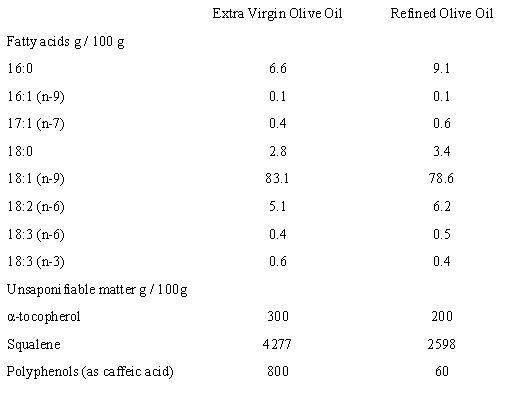Olive oil contains virtually no alpha linolenic acid (ALA) and only small quantities of linoleic acid (LA), but is instead composed of mainly monounsaturated oil. Despite this, research suggests that olive oil has a preventative effect against cardiovascular disease. Extra-virgin olive oil is an oil extracted from olives using only cold pressing methods. Mechanical presses squeeze the olives to remove the oil and sieves remove most of the large particles of debris. Extra-virgin olive oil is thought to provide health benefits because many of the antioxidant phytonutrients survive the processing. In contrast, refined olive oil is extracted with heat and solvents. This destroys many of the phytonutrients present in the olives. Mechanical pressing produces lower yields of oils than conventional extraction with solvents and heat, and so virgin olive oil is generally more expensive. The suspended phytonutrients also make it darker in colour.
To investigate the effect of olive oil on cardiovascular disease, researchers1 fed 24 men with peripheral vascular disease refined olive oil or extra-virgin olive oil and measured LDL oxidation rates and the fatty acid profiles of their plasma. Subjects consumed the oil for 3 months, followed by a 3 month wash out period before switching to the different oil. The fatty acid and antioxidant profiles of the two oils are shown in figure 1, and demonstrate the low concentration of essential fatty acids in olive oil. The results showed that while the fatty acid composition did not differ between the plasma in the two groups, the oxidation of LDL was higher in those consuming the refined oil. In addition, those subjects consuming the refined oil showed greater uptake of LDL lipoproteins to macrophages, demonstrating progression of the disease.
 Figure 1. The fatty acid and antioxidant profiles of refined and extra virgin olive oils.
Figure 1. The fatty acid and antioxidant profiles of refined and extra virgin olive oils.
These results suggest that the mainly monounsaturated fatty acids in olives are not responsible for the health benefits associated with consuming olives. This supports other research that suggests that monounsaturated fats are relatively neutral in their health effects. Further, olives do not contain high enough levels of the essential fatty acid ALA to cause significant health benefits. Instead, it appears that olive oil is beneficial because of the antioxidants it contains. These antioxidants present in olives are transferred to extra-virgin olive oil during processing, but are absent from refined olive oil. It is therefore recommended that only extra-virgin olive oil is consumed. A diet high in olives is known to provide cardiovascular benefits to those who live in the Mediterranean and the phytonutrients in extra-virgin olive oil may contribute to this effect.
RdB
